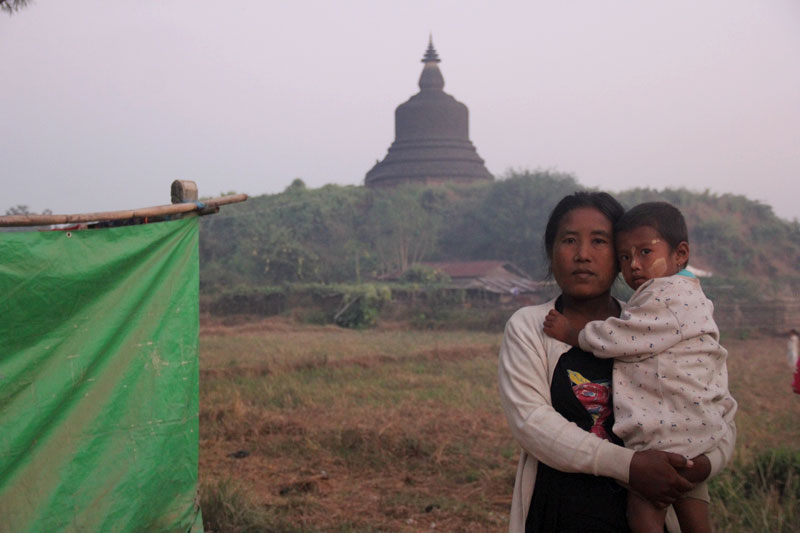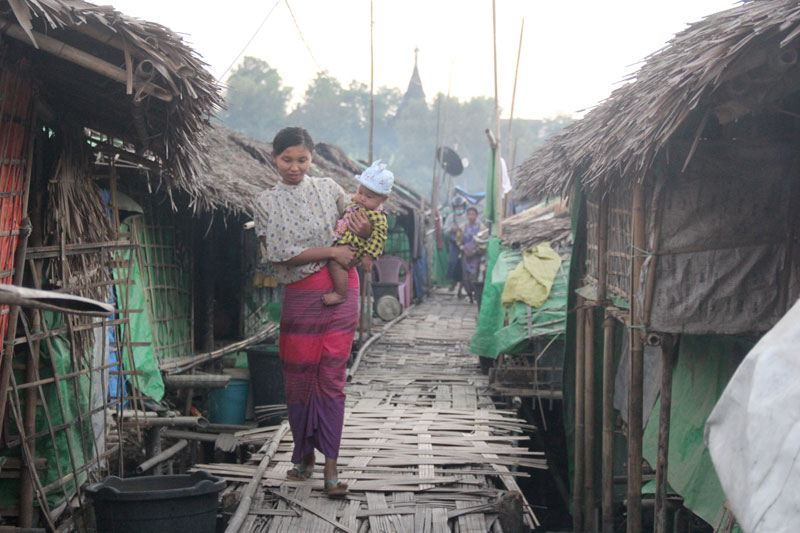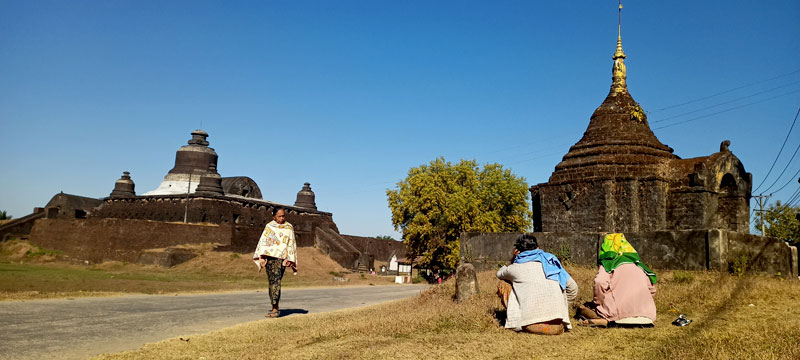- Extreme poverty drives Sittwe residents to dismantle abandoned houses for income
- Weekly Highlights from Arakan (Feb 23 to March 1, 2026)
- Over 300 political prisoners freed from 10 prisons nationwide
- DMG Editorial: Between War and Opportunity - A New Border Reality for Bangladesh and Arakan
- Arakan Army sets five-year prison term for kratom cultivation in controlled areas
Women in Arakan's IDP camps yearning to live in Hygiene
Teenage girls and women in Internally Displaced Person (IDP) camps in north of Arakan (Rakhine) State are hoping the support of sanitary napkins from international aid organizations after they have endured three previous cycles without hygiene pads.
20 Dec 2020

By MOE MYINT | Fojo
20 December 2020
YANGON – Teenage girls and women in Internally Displaced Person (IDP) camps in north of Arakan (Rakhine) State are hoping the support of sanitary napkins from international aid organizations after they have endured three previous cycles without hygiene pads.
May Hsu Hlaing, 35, from Sayti Taung village, now sheltering in a camp in Rathedaung Township said that many IDPs women could not afford to use hygiene pads as they fled from their homes empty-handed.
"ICRC aid packages include pads for women but we haven't seen them for three months. As we are jobless, we have no income now. So, we could not afford to buy pads for adult girls monthly, especially for some families those have three to four girls," said May Hsu Hlaing.
Nearly 194,094 civilians were displaced by lengthy armed conflicts between the Arakan Army (AA) - a rebel group fighting for the greater autonomy- and the nation's powerful military also known as ‘Tatmadaw’ in Arakan since late 2018.
United Nations, international aid agencies and local grassroots organizations have different headcount on IDP women population as the government doesn't recognize people sheltering in monasteries and neighboring villages as IDPs. Rakhine Ethnics Congress (REC) says there are 158 camps across northern Arakan, including some in monasteries.
Arakan State government's Municipal Affairs Minister Win Myint, also holds spokesperson role could not be reached for comment on 17 December. According to United Nations OCHA Myanmar December update, there are 104,000 IDPs in both Arakan and its neighboring Chin State's Paletwa Township.
For the past year, international relief groups like International Committee of the Red Cross (ICRC) and World Food Programme (WFP) contributed relief packages to IDPs, including personal hygiene kits. However, displaced people in monasteries and community halls were mostly overlooked as distributed only government recognized places. According to government report, there are about 79,000 IDPs in total.
Little privacy
May Hsu Hlaing said that before fighting taken place in the region, locals could earn extra money by growing seasonal fruits in the village. Being an IDP, they have now to fully rely on donors.
Rakhine Ethnic Congress (REC)'s secretary Zaw Zaw Htun explained when the global pandemic surged starting from August in Myanmar, World Food Programme (WFP) turned ration distribution into cash assistance. Myanmar has now exceeded over 100,000 cases and tallied 2,132 deaths nationwide in early December, 2020.
He said that WFP supports 15,000 MMK (10.90 USD) for one person a month which means each IDP gets just 500 MMK (0.36 USD) per day. It's less than the price for a cup of Burmese tea in Yangon.
Moreover, international aid agencies are told not to repeat the distribution in the same areas where local authorities are supporting relief food because they concerned that rice being extorted by the AA rebels. But locals say sanitary napkin is rarely seen in the government’s aid program.
"For instance, nearly the entire IDP population taking refuge in monasteries in Myebon Township is out of ICRC relief program as the government doesn't recognize them IDP."
Phone calls to ICRC Myanmar's Yangon office went unanswered on December 8. Public Health Department for Arakan State's Deputy Director Soe Win Paing acknowledges that hygiene project is not in their priority because its international partners (INGOs) are addressing the issue.
"I think those who have no access to sanitary napkins might be from unofficial IDP camps," said Deputy Director Soe Win Paing.
He claims that his health department instructs branch offices and volunteers to provide basic health care for everyone but there might be weaknesses due to outnumbered volunteers on the ground.
According to REC's latest figure, the population living in monastery, community hall and neighboring villages is made of 115,092 but specific number of women IDP is unavailable.

Another grassroots organization Rakhaing Women's Union (RWU) which led by a prominent peacemaker Saw Mra Razar Lin, is now in Arakan State for its humanitarian works, and agrees with REC. She is a top leader of Nationwide Ceasefire Signatory (NCA) representing the armed-wing of Arakan Liberation Army (ALA) of the Arakan Liberation Party (ALP).
Saw Mra Razar Lin recalls her trip experiences that adult girls and women barely have their space for privacy as they have been sheltering in monastery-halls or in government schools for months. Hundreds of people have to share the same rooms to sleep at night.
"Living condition in camps is distressful for women. There is no proper bathroom where women can freely have a shower. Many people have to share a room for a bath," said Saw Mra Razar Lin.
Living in camps can also have unpleasant experiences such as harassment and abuses. REC secretary Zaw Zaw Htun told Fojo that verbal abuses against young women in camps have been reported sometimes. Now women have practiced sleeping in groups at night as they fear of sexual harassment and other unsafe scenarios against women.
"When the space is too narrow, sometimes women and men are in close physical contact. So, women are not able to stay comfortably even in the daytime," said Zaw Zaw Htun.
Traditional way
RWU's patron Bhu May said that sanitary pads need every single month for women starting from teenager to aged group under 60. She believes a hygiene pad is the second most important thing for a woman in her daily life. Many women were unable to bring their clothes when they fled from their homes to urban areas.
"Even they have limited quantity to use cloth and longyi during their periods," Bhu May said.
Due to religious norms and conservative customs, IDP women sheltering in monasteries experience social stigmas when they are in period. Women use a piece of their longyi and wash blood stained clothes to reuse it on daily basis. Sometimes they can't use sufficient amount of water for laundry due to water scarcity in camps or monasteries. As a result, blood stained in clothes.
When they hang red-color stained ‘Sargon’ locally known ‘Htamee’ on the fence or wall of Buddhist monastery to dry, it draws criticisms from host community describing inappropriate pieces. According to REC, social taboos generally happen in Kyauktaw Township where the vast majority IDPs seeks refuge in monasteries.
"Many people have no idea about menstrual hygiene or reproductive health because there is lack of hygiene awareness campaign in rural areas," said Saw Mra Razar Lin.
Hygiene literacy rate is extremely poor in rural areas. Women from remote villages even don't know how to properly use sanitary pads. Health official Soe Win Paing said they don't have proper indicator regarding hygiene literacy rate in Arakan, however, he thinks Arakan might be in at the top-list.
"Arakan is still very far from it (personal hygiene literacy)," said Soe Win Paing.
The Arakan National Party (ANP)'s Rathedaung lawmaker Khin Saw Wai said that women from rural area have been practicing traditional ways – wearing two to three layers of ‘Htamee’ or use unclean clothes — to cope with menstrual period rather than using sanitary pads widely available nowadays in some big villages. When they are in period, women tend to stick at home for a couple of days so that they can avoid embarrassment within the community. This practice is forced to end when the conflict forced them out of their homes.
"Girls are very shy to talk about it," said Saw Mra Razar Lin.
In a BBC report in November 2017, more than 90 percent of rural India women used uncleaned homemade pad. When researchers from the Tata Memorial Centre and National Institute for Research in Reproductive Health in India analyzed the used pads, they learned the presence of human papilloma virus (HPV) which can lead cervical cancer if not treated in early stage.

However, Arakan State's health officer Soe Win Paing insisted that there is a slim chance to have genital infection in women by using clothes if they could wash and clean regularly, which is problematic when resources are insufficient in IDP camps. Even using napkins for all day without disposing can cause infection. He acknowledges that personal hygiene literacy is extremely low in Arakan.
Lawmaker Khin Saw Wai said that except remote places, affordable domestic sanitary pads are accessible in many places. Therefore, she thinks when IDPs are able to return their homes safely; sanitary napkin will no longer be a big deal but awareness campaign is necessary to elevate personal hygiene problem in the long run.
Since November election, there was no hostile clash between AA and military battalions in Arakan. Politicians and observers hope it as a positive sign for peace. REC has reported that around 70,000 displaced locals returned homes to harvest paddy and seasonal fruits.
However, some villages situated nearby artillery corps or military battalions remain in the camps as they are concerned arbitrary arrests of the military or unexpected landmine incidents.
"As an IDP woman, I would like to urge both military and AA to lay down their arms and find a peaceful solution. When two bulls fight, it is the grass that suffers," said displaced villager May Hsu Hlaing.
- This feature is supported by Fojo Media Institute.








.jpg)











